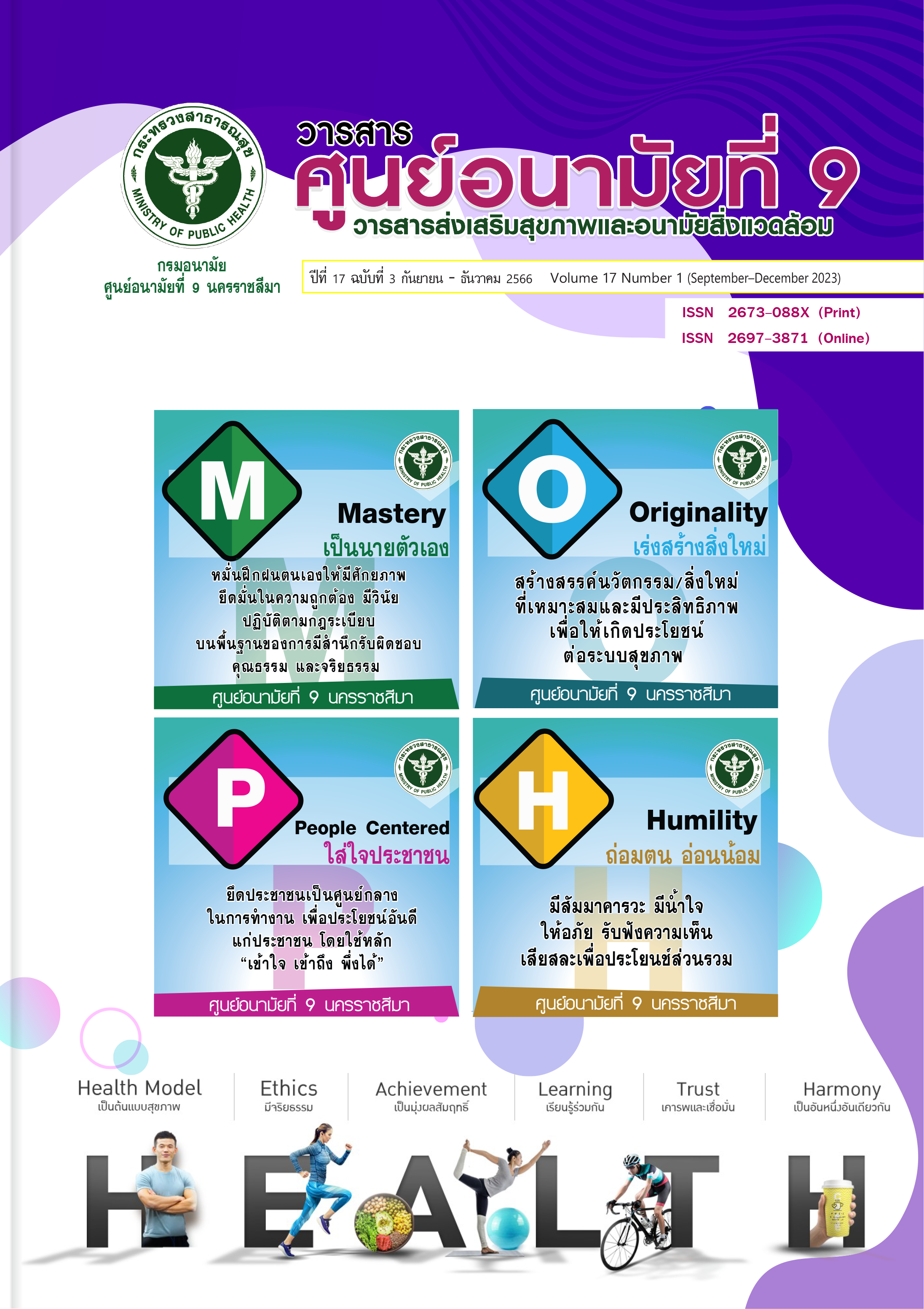Self-concept of Family Caregivers of Palliative Patients: A scoping review
คำสำคัญ:
Self-concept, Family caregivers, Palliative care, Scoping reviewบทคัดย่อ
Self-concept refers to how someone perceives themselves, and it is important for the psychological well-being of an individual. Taking on the role of family caregivers for patients with palliative care becomes a challenge for some caregivers in various aspects and could affect their individual self-concept. This scoping review aims to systematically identify the characteristics of all relevant individual studies relating to self-concept of family caregivers of palliative patients. Relevant studies published from 2010 to 2023 were sought by searching online databases, including PubMed, Embase, and Google Scholar. The Jonna Briggs Institute (JBI) scoping review protocol was applied for the methodological aspects of this study. A total of 643 references were identified, but only 14 studies were eligible to be included. The results reveal that when measuring self-concept among family caregivers of palliative patients, self-efficacy is the main major concern besides self-value, self-acceptance, and self-respect. Moreover, the result also shows factors that correlate to self-efficacy and supports the idea that self-efficacy contributes to the mental health of caregivers and the caregiver’s and patient’s quality of life.
เอกสารอ้างอิง
World Health Organizaton. Palliative care 2020 [Available from: https://www.who.int/news-room/fact-sheets/detail/palliative-care.
GetPalliativeCare. What Is Palliative Care? 2022 [Available from: https://getpalliativecare.org/whatis/.
Department of Medical Service. Guidebook for palliative and hospice care (for healthcare professionals). Department of medical service: Ministry of Public Health; 2020.
Hagedoorn EI, Paans W, Jaarsma T, Keers JC, van der Schans C, Luttik ML. Aspects of family caregiving as addressed in planned discussions between nurses, patients with chronic diseases and family caregivers: a qualitative content analysis. BMC Nurs. 2017;16:37.
Kanchanachari O, Sirapo-ngam Y, Monkong S. Roles and needs of caregivers for patients with end of lifein a specific setting for palliative care. Ramathibodi Nursing 2017;23(3):323-43.
American Psychological Association. What Do Family Caregivers Do? 2022. Available from: https://www.apa.org/pi/about/publications/caregivers/faq/family.
Adashek JJ, Subbiah IM. Caring for the caregiver: a systematic review characterising the experience of caregivers of older adults with advanced cancers. ESMO Open. 2020;5(5):e000862.
Williams AL, McCorkle R. Cancer family caregivers during the palliative, hospice, and bereavement phases: a review of the descriptive psychosocial literature. Palliat Support Care. 2011;9(3):315-25.
Keramatikerman M. A Systematic Review on Challenges Faced by Family Caregivers of Cancer Patients. Open Access Journal of Biomedical Science. 2020;2(4).
10. Roy C, Andrews H. The Roy Adaptation Model 2, editor. Stamford: Connecticut: Appleton&Lange; 1999.
Duggleby WD, Williams A, Holstlander L, Thomas R, Cooper D, Hallstrom LK, et al. Hope of rural women caregivers of persons with advanced cancer: guilt, self-efficacy and mental health. Rural Remote Health. 2014;14:2561.
Zhang S, Edwards H, Yates P, Li C, Guo Q. Self-efficacy partially mediates between social support and health-related quality of life in family caregivers for dementia patients in Shanghai. Dement Geriatr Cogn Disord. 2014;37(1-2):34-44.
Leung DYP, Chan HYL, Chiu PKC, Lo RSK, Lee LLY. Source of Social Support and Caregiving Self-Efficacy on Caregiver Burden and Patient's Quality of Life: A Path Analysis on Patients with Palliative Care Needs and Their Caregivers. Int J Environ Res Public Health. 2020;17(15).
Cheng ST, Lam LC, Kwok T, Ng NS, Fung AW. Self-efficacy is associated with less burden and more gains from behavioral problems of Alzheimer's disease in Hong Kong Chinese caregivers. Gerontologist. 2013;53(1):71-80.
15. Liu HY, Huang LH. The relationship between family functioning and caregiving appraisal of dementia family caregivers: caregiving self-efficacy as a mediator. Aging Ment Health. 2018;22(4):558-67.
Mystakidou K, Parpa E, Panagiotou I, Tsilika E, Galanos A, Gouliamos A. Caregivers' anxiety and self-efficacy in palliative care. Eur J Cancer Care (Engl). 2013;22(2):188-95.
Yang Z, Tian Y, Fan Y, Liu L, Luo Y, Zhou L, et al. The mediating roles of caregiver social support and self-efficacy on caregiver burden in Parkinson's disease. J Affect Disord. 2019;256:302-8.
Ugalde A, Krishnasamy M, Schofield P. The relationship between self-efficacy and anxiety and general distress in caregivers of people with advanced cancer. J Palliat Med. 2014;17(8):939-41.
Semiatin AM, O'Connor MK. The relationship between self-efficacy and positive aspects of caregiving in Alzheimer's disease caregivers. Aging Ment Health. 2012;16(6):683-8.
Kizza IB, Muliira JK. Determinants of quality of life among family caregivers of adult cancer patients in a resource-limited setting. Supportive Care in Cancer. 2020;28(3):1295-304.
Mroz EL, Poulin MJ, Grant PC, Depner RM, Breier J, Byrwa DJ, et al. Caregiver Self-Esteem as a Predictor of Patient Relationship Satisfaction: A Longitudinal Study. J Palliat Med. 2018;21(3):376-9.
Durmaz H, Okanlı A. Investigation of the effect of self-efficacy levels of caregiver family members of the individuals with schizophrenia on burden of care. Arch Psychiatr Nurs. 2014;28(4):290-4.
23. Soroka JT, Froggatt K, Morris S. Family Caregivers' Confidence Caring for Relatives in Hospice Care at Home: An Exploratory Qualitative Study. Am J Hosp Palliat Care. 2018;35(12):1540-6.
Carlander I, Sahlberg-Blom E, Hellström I, Ternestedt BM. The modified self: family caregivers' experiences of caring for a dying family member at home. J Clin Nurs. 2011;20(7-8):1097-105.
Markus H, Wurf E. The Dynamic Self-Concept: A Social Psychological Perspective. Annual Review of Psychology. 1987;38(1):299-337.
ดาวน์โหลด
เผยแพร่แล้ว
รูปแบบการอ้างอิง
ฉบับ
ประเภทบทความ
สัญญาอนุญาต
ลิขสิทธิ์ (c) 2023 วารสารศูนย์อนามัยที่ 9 : วารสารส่งเสริมสุขภาพและอนามัยสิ่งแวดล้อม

อนุญาตภายใต้เงื่อนไข Creative Commons Attribution-NonCommercial-NoDerivatives 4.0 International License.
บทความหรือข้อคิดเห็นใด ๆ ที่ประกฎในวารสารศูนย์อนามัยที่ 9 เป็นความคิดเห็นของผู้เขียน บรรณาธิการ คณะผู้จัดทำ และศูนย์อนามัยที่ 9 นครราชสีมา (เจ้าของ) ไม่จำเป็นต้องเห็นด้วย ผู้เขียนต้องรับผิดชอบต่อบทความของตนเอง
ผลการพิจารณาของกองบรรณาธิการและผู้ทรงคุณวุฒิถือเป็นที่สิ้นสุด คณะบรรณาธิการวารสารฯ ขอสงวนสิทธิ์ในการตรวจแก้ไขข้อความให้ถูกต้องตามหลักภาษาและมีความเหมาะสม
กองบรรณาธิการวารสารฯ ขอสงวนสิทธิ์มิให้นำเนื้อหาใด ๆ ของบทความ หรือข้อคิดเห็นใด ๆ ของผลการประเมินบทความในวารสารฯ ไปเผยแพร่ก่อนได้รับอนุญาตจากกองบรรณาธิการ อย่างเป็นลายลักษณ์อักษร และผลงานที่ได้รับการตีพิมพ์ถือเป็นลิขสิทธิ์ของวารสารศูนย์อนามัยที่ 9


